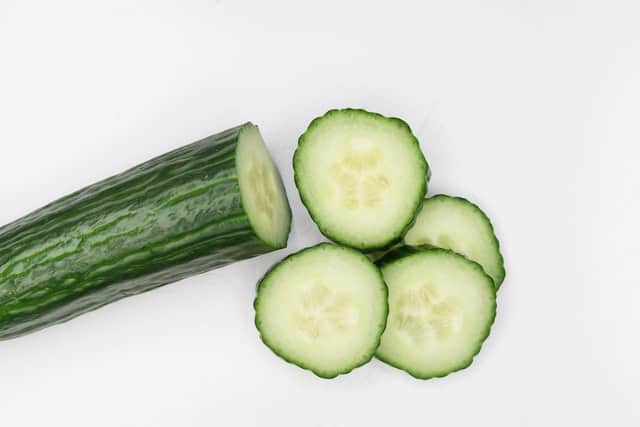
Did you know that cucumbers are apparently fruits and not vegetables? Well, it turns out they are, in fact, fruits! Whether it be eating them as it is, a salad, a side dish, or even as a beverage, cucumbers are one of the most versatile fruits that you can add to just about any dish or drink. This is because the mild flavor enables cucumbers to be added to any dish without compromising the taste.
Cucumbers are typically harvested in warmer temperatures, making them great to savor during the summer (or any time, really). But the real question is, are cucumbers safe for people with diabetes? Well, read on to learn more on cucumbers, its effect on blood glucose levels, other health benefits, and the nutrition it provides. Without further ado, let’s get right to it!
Contents
Nutrition in cucumbers
Cucumbers are close relatives of melons and squashes as they have a common botanical family. There are two types of cucumbers you may find: sliced cucumbers (where you can eat them fresh) and pickling cucumbers (where they are essentially processed to pickles). A particular highlight of cucumbers is the fact that they are low in carbs and calories as they are mostly made up of water. This makes cucumbers both filling and diet-friendly.
Half a serving cup has 8 calories, 1.8 grams of carbs, 0.87 grams of sugar, 0.3 grams of fiber, 0.34 grams of protein, and 0.06 grams of fat. In addition, cucumbers are also packed with multiple vitamins and essential minerals. They include vitamins B, C, and K, along with potassium, magnesium, and phosphorus, to promote healthy body functions in just a few slices.
To top that off, cucumbers are also enriched with plant chemicals called phytonutrients such as flavonoids, lignans, and triterpenes. These phytonutrients are potent antioxidants that provide protection for your body against cell damage, which also means mitigating the chances of diseases from developing any further.
Cucumbers and Blood Glucose

In short, cucumbers are deemed safe to eat for people with diabetes! An apparent indicator can be found through their Glycemic index. The glycemic index (also known as GI) is the measure of how much the foods you consume affect your blood glucose levels. Essentially, the higher the glycemic index, the more it can increase your blood glucose levels, which is something all people with diabetes should avoid at all costs. Anything less than a glycemic index of 55 is classified as low.
Fortunately, cucumbers have one of the lowest glycemic indexes among fruits, standing at only 15. Other low glycemic index fruits such as bananas, apples, and grapefruits have a slightly higher glycemic index than cucumbers. In other words, cucumbers are great for bites or snacks without needing to worry about blood sugar spikes.
As a matter of fact, cucumbers may actually aid in reducing blood glucose levels as they are indeed low in carbohydrates and sugars. Though studies are still early in development, there have been intriguing findings.
In a study back in 2012, research has shown that the phytonutrients found in cucumbers were associated with decreasing blood glucose levels in diabetic rats. Not to mention the fact that cucumbers may also aid in mitigating the risk of hypoglycemia (when blood glucose levels run too low). However, please note that findings have been limited to animal and test-tube studies. Human trials have not been conducted as of this moment.
In order to ensure you can have cucumbers incorporated into your diet safely, we highly recommend seeking professional medical advice from your local health provider.
Other health benefits of eating cucumbers
Aside from having blood glucose-lowering effects, cucumbers provide other health benefits. A particular highlight worth mentioning is the presence of beta-carotene, the pigment in the cucumber’s skin that gives off that fresh green color. Beta-carotene can be converted to vitamin A by your body to ensure that your skin and eyes are in tip-top shape. Here are the other health benefits that cucumbers have to offer:
Your weight manager
A typical 300-gram cucumber only packs in about 45 calories with low calories, carbs, and sugars. The fruit is almost entirely made up of water. The fact that they are considered non-starchy fruits makes them filling and nutritious without adding too many calories per serving. These factors make cucumbers a great snack and addition to your daily routine, especially when you are on a diet plan, as they can aid in lowering or maintaining your ideal body weight.
Abundant in antioxidants
Antioxidants are oxidation-blocking molecules that essentially protect your body cells against damages caused by free radicals. These free radicals are harmful as they can cause oxidative stress. Oxidative stress is a chemical reaction that, when accumulated, may eventually lead or develop into chronic diseases such as cancer, lung, autoimmune, and heart diseases.
Fortunately, cucumbers are loaded with antioxidants, which also means they are well capable of preventing oxidative stress and help maintain cell functions. Two of the antioxidants found in cucumber, specifically known as flavonoids and tannins, have been proven effective against harmful free radicals in a test tube study conducted in 2010.
Keeps your hydrated
The fact that cucumbers are 96% water makes it no surprise why it is a great way to intake water into your body. Hydration is absolutely essential as it serves multiple purposes for your body that includes regulating your body temperature, transporting nutrients, and managing waste products in your body.
The ideal water intake amount you should take in a day should be 8 glasses or 2 liters of water. With that being said, foods such as fruits and veggies, including cucumber, may help you achieve your daily water intake requirement. Consider cucumbers as both a go-to drink and a snack.
Promotes regularity
To add to its benefit as a good source of hydration, cucumber may also support regular bowel movements. Water and fiber in cucumbers contribute to promoting stool consistency, which keeps you away from unpleasant visits to the bathroom due to constipation.
A particular fiber called pectin in cucumbers aids in increasing the frequency of bowel movements. This was proven in a study where pectin was able to increase the movement speed of intestinal muscles while feeding good gut bacteria that ensures a healthy digestive tract.
How many cucumbers can I eat in a day?

Though eating as many cucumbers as you’d like won’t be an issue in terms of affecting blood glucose levels, having one too many cucumbers in one go may not be a good idea. Having excessive amounts of anything is never leads to any good. In this case, it may cause stomach pain.
So, how many can you ideally have in a day, you may ask. A few ounces of cucumber or perhaps around 2 to 3 cucumbers should keep you away from any stomach pain, all while still being able to enjoy all the health benefits it has in store.
One of the best ways to determine an exact quantity or portion size is by consulting with your local health care provider, just to be safe.
The bottom line
In short, cucumbers definitely have the green light for people with diabetes to safely and peacefully enjoy. These fruits make a great snack and side dish that is not only packed with enriched nutrients such as vitamins B, C, and K, other essential minerals, but its non-starchy properties also make it a filling fruit to add to your daily meal plans.
Cucumbers are widely known as low-calorie foods, which also means low carbs and sugars, making them ideal for people with diabetes to savor and enjoy. In addition, cucumbers have a significantly low glycemic index (15), which basically means you won’t ever have to worry about any blood glucose spikes as you eat a whole fruit or two. Though studies are still in the early stages, cucumbers are associated with reducing blood glucose levels in animal testing through the phytonutrients (antioxidants) found in cucumbers.
Moreover, cucumbers also provide other health benefits. These fruits offer abundant levels of antioxidants that help your body combat free radicals, and in return, mitigate the chances for chronic diseases such as cancer or heart diseases from developing in the first place. Another is its high-water contents (as it comprises 96% water) makes cucumbers a great source of hydration, an essential factor in body functions such as transportation of nutrients and regulation of your body temperature.
Cucumbers are also great for promoting regularity in your bowel movements, keeping you away from constipation while also ensuring a healthy frequency of bowel movements using a fiber called pectin.
Though you technically can have as many cucumbers as you want without the fear of drastically raising blood glucose levels, it is crucial to know how much is too much. Having one too many cucumbers can cause a stomach upset, which is never the way to go. A good rule of thumb is to have a few ounces a day, so you can still have them without any loud belly rumbles.





